Hyundai IONIQ 5 vs Mercedes EQB – Which one offers the better deal?
Both models have their strengths – but which one suits you more?
Compare performance, efficiency, price and space directly: Hyundai IONIQ 5 or Mercedes EQB?
Costs and Efficiency:
Price and efficiency are key factors when choosing a car – and this is often where the real differences emerge.
Hyundai IONIQ 5 has a to a small extent advantage in terms of price – it starts at 38500 £, while the Mercedes EQB costs 45900 £. That’s a price difference of around 7384 £.
In terms of energy consumption, the advantage goes to the Mercedes EQB: with 15.20 kWh per 100 km, it’s slight more efficient than the Hyundai IONIQ 5 with 15.60 kWh. That’s a difference of about 0.40 kWh.
As for range, the Hyundai IONIQ 5 performs minimal better – achieving up to 570 km, about 35 km more than the Mercedes EQB.
Engine and Performance:
Power, torque and acceleration say a lot about how a car feels on the road. This is where you see which model delivers more driving dynamics.
When it comes to engine power, the Hyundai IONIQ 5 has a decisively edge – offering 650 HP compared to 292 HP. That’s roughly 358 HP more horsepower.
In acceleration from 0 to 100 km/h, the Hyundai IONIQ 5 is convincingly quicker – completing the sprint in 3.50 s, while the Mercedes EQB takes 6.20 s. That’s about 2.70 s faster.
In terms of top speed, the Hyundai IONIQ 5 performs clearly perceptible better – reaching 260 km/h, while the Mercedes EQB tops out at 160 km/h. The difference is around 100 km/h.
There’s also a difference in torque: Hyundai IONIQ 5 pulls noticeable stronger with 770 Nm compared to 520 Nm. That’s about 250 Nm difference.
Space and Everyday Use:
Beyond pure performance, interior space and usability matter most in daily life. This is where you see which car is more practical and versatile.
Both vehicles offer seating for 5 people.
In curb weight, Hyundai IONIQ 5 is slight lighter – 1955 kg compared to 2105 kg. The difference is around 150 kg.
In terms of boot space, the Hyundai IONIQ 5 offers minimal more room – 520 L compared to 495 L. That’s a difference of about 25 L.
In maximum load capacity, the Mercedes EQB performs barely noticeable better – up to 1710 L, which is about 130 L more than the Hyundai IONIQ 5.
When it comes to payload, Hyundai IONIQ 5 somewhat takes the win – 530 kg compared to 435 kg. That’s a difference of about 95 kg.
Who comes out on top?
Overall, the Hyundai IONIQ 5 shows itself to be wins the duel decisively and secures the title of DriveDuel Champion.
It convinces with the more balanced overall package and proves to be the more versatile choice for everyday use.
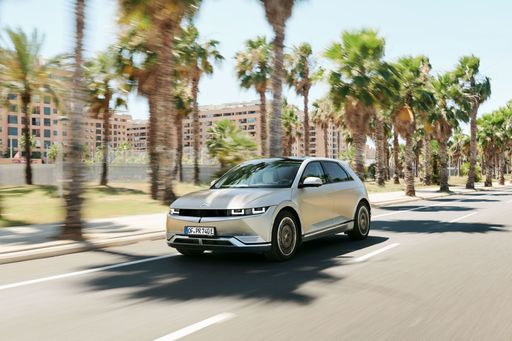 @ Hyundai Motor Company
@ Hyundai Motor Company
Hyundai IONIQ 5
Hyundai IONIQ 5
The Hyundai IONIQ 5 looks like a spaceship that moved into suburbia, pairing bold retro‑futuristic styling with a roomy, cleverly laid-out cabin that makes long trips surprisingly comfortable. Its electric character delivers instant, silky acceleration and low running costs, making it a smart, slightly cheeky pick for buyers who want tech, practicality and personality without the drama.
details @ Hyundai Motor Company
@ Hyundai Motor Company
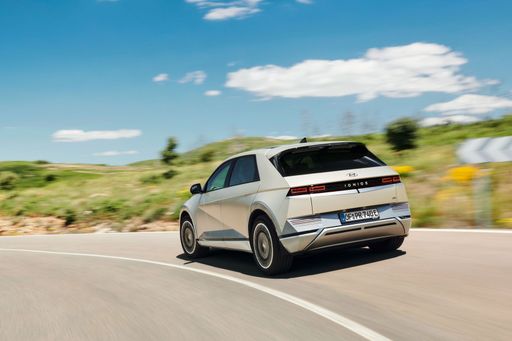 @ Hyundai Motor Company
@ Hyundai Motor Company
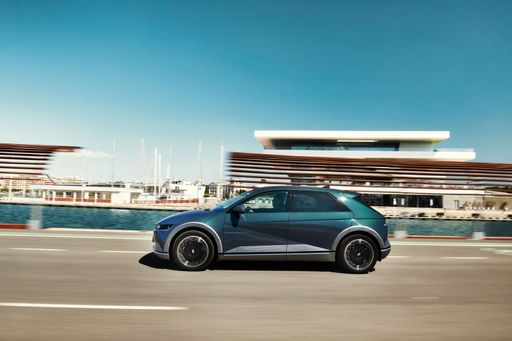 @ Hyundai Motor Company
@ Hyundai Motor Company
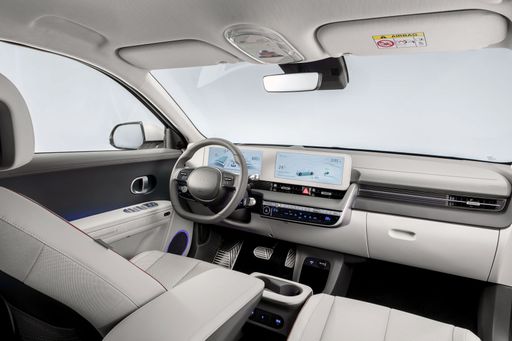 @ Hyundai Motor Company
@ Hyundai Motor Company
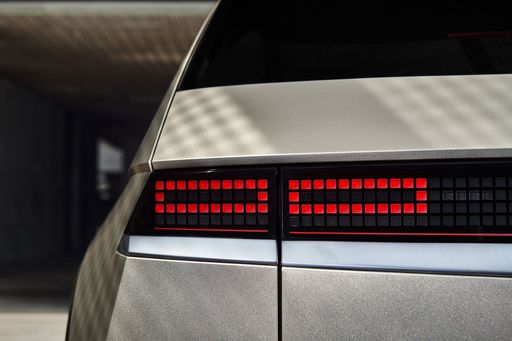 @ Hyundai Motor Company
@ Hyundai Motor Company
Mercedes EQB
The Mercedes EQB is an electric compact SUV that dresses Mercedes' premium feel in practical clothing, with flexible seating and a serene, composed ride that turns everyday errands into a small luxury. It won't thrill the enthusiast, but for buyers who want a smart, spacious and well-made EV with tasteful tech and real-world usability, the EQB is a sensible, slightly buttoned-up choice that impresses without shouting.
details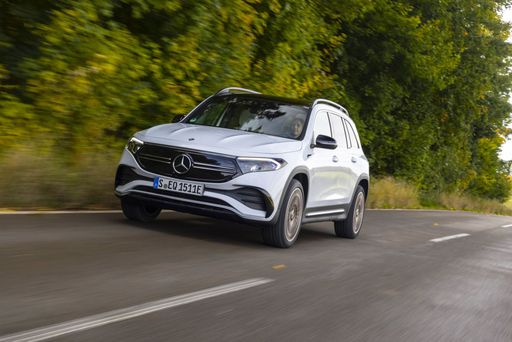 @ Mercedes-Benz Group Media
@ Mercedes-Benz Group Media
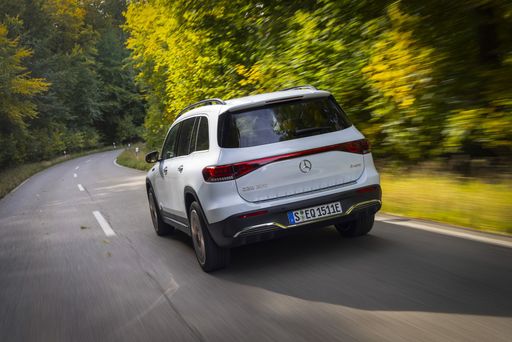 @ Mercedes-Benz Group Media
@ Mercedes-Benz Group Media
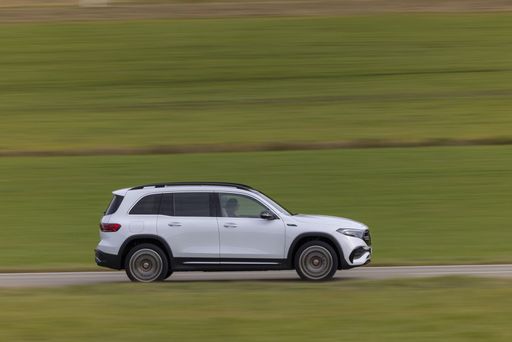 @ Mercedes-Benz Group Media
@ Mercedes-Benz Group Media
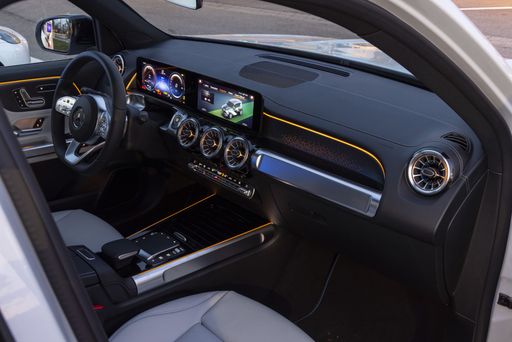 @ Mercedes-Benz Group Media
@ Mercedes-Benz Group Media
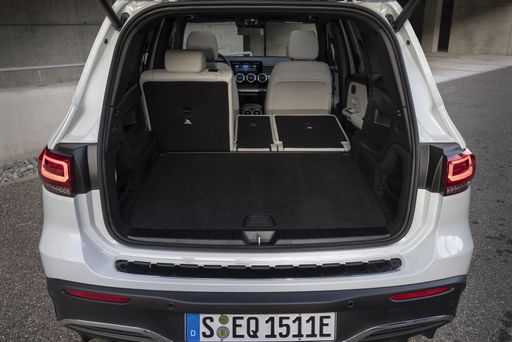 @ Mercedes-Benz Group Media
@ Mercedes-Benz Group Media
 @ Hyundai Motor Company
@ Hyundai Motor Company
|
 @ Mercedes-Benz Group Media
@ Mercedes-Benz Group Media
|
|
|
|
Costs and Consumption |
|
|---|---|
|
Price
38500 - 64200 £
|
Price
45900 - 58900 £
|
|
Consumption L/100km
-
|
Consumption L/100km
-
|
|
Consumption kWh/100km
15.6 - 21.2 kWh
|
Consumption kWh/100km
15.2 - 17.2 kWh
|
|
Electric Range
440 - 570 km
|
Electric Range
468 - 535 km
|
|
Battery Capacity
63 - 84 kWh
|
Battery Capacity
70.50 kWh
|
|
co2
0 g/km
|
co2
0 g/km
|
|
Fuel tank capacity
-
|
Fuel tank capacity
-
|
Dimensions and Body |
|
|---|---|
|
Body Type
SUV
|
Body Type
SUV
|
|
Seats
5
|
Seats
5
|
|
Doors
5
|
Doors
5
|
|
Curb weight
1955 - 2275 kg
|
Curb weight
2105 - 2170 kg
|
|
Trunk capacity
480 - 520 L
|
Trunk capacity
495 L
|
|
Length
4655 - 4715 mm
|
Length
4684 mm
|
|
Width
1890 - 1940 mm
|
Width
1834 mm
|
|
Height
1585 - 1605 mm
|
Height
1654 - 1689 mm
|
|
Max trunk capacity
1540 - 1580 L
|
Max trunk capacity
1710 L
|
|
Payload
385 - 530 kg
|
Payload
435 kg
|
Engine and Performance |
|
|---|---|
|
Engine Type
Electric
|
Engine Type
Electric
|
|
Transmission
Automatic
|
Transmission
Automatic
|
|
Transmission Detail
Reduction Gearbox
|
Transmission Detail
Reduction Gearbox
|
|
Drive Type
Rear-Wheel Drive, All-Wheel Drive
|
Drive Type
Front-Wheel Drive, All-Wheel Drive
|
|
Power HP
170 - 650 HP
|
Power HP
190 - 292 HP
|
|
Acceleration 0-100km/h
3.5 - 8.5 s
|
Acceleration 0-100km/h
6.2 - 8.9 s
|
|
Max Speed
185 - 260 km/h
|
Max Speed
160 km/h
|
|
Torque
350 - 770 Nm
|
Torque
385 - 520 Nm
|
|
Number of Cylinders
-
|
Number of Cylinders
-
|
|
Power kW
125 - 478 kW
|
Power kW
140 - 215 kW
|
|
Engine capacity
-
|
Engine capacity
-
|
General |
|
|---|---|
|
Model Year
2024 - 2025
|
Model Year
2024 - 2025
|
|
CO2 Efficiency Class
A
|
CO2 Efficiency Class
A
|
|
Brand
Hyundai
|
Brand
Mercedes-Benz
|
What drive types are available for the Hyundai IONIQ 5?
The Hyundai IONIQ 5 is available as Rear-Wheel Drive or All-Wheel Drive.
The prices and data displayed are estimates based on German list prices and may vary by country. This information is not legally binding.
